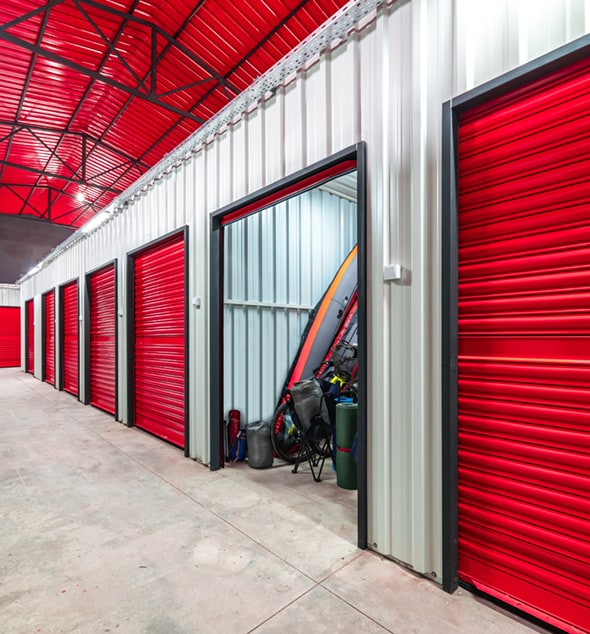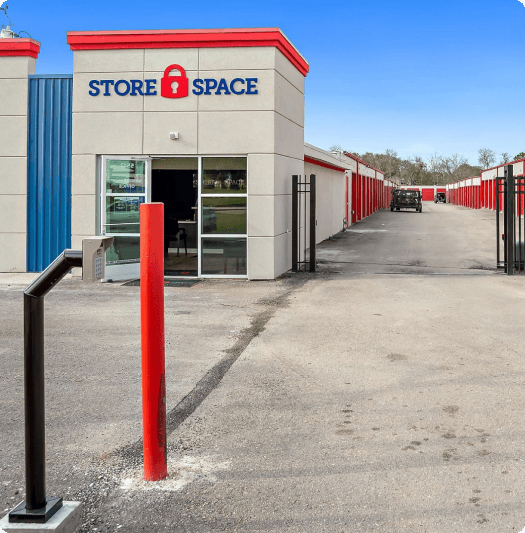Best Jet Ski Storage: 4 Reasons Why Storage Units Are Vital for Jet Skiers

Before we start talking about jet ski storage and winterization tips, let's look back and see how you got to this point.
For as long as you can remember, you've wanted a jet ski. You put posters on your wall. You collected brochures and memorized everything about them. You planned on living by the water, so you could jet ski as the sun came up and before the sun went down. You were going to get married on matching jet skis!
OK, maybe some of those things haven't happened in your timeline yet, but at least you have the jet ski, right? Wow.
Read on for a few of our favorite reasons to own a jet ski (plus a little history), winterization tips, and the types of storage options available.
What's a PWC and whose Water Scooter is that?
Did you know that all jet skis are personal watercraft (PWC), but not all personal watercraft are jet skis?
What now? Technically, "Jet Ski" is a registered trademark of Kawasaki, so you should probably refer to them as "personal watercraft" or "water scooter" if you don't want to get sued.
But that hasn't stopped pretty much everyone from using "jet ski" generically, because, let's be honest, "jet ski" sounds way cooler.
Clayton Jacobson II is credited with inventing the jet ski concept in the 1960s as a "motorcycle for the water" after repeatedly getting road rash from motorcycle racing.
– Wikipedia
The first type of water scooter was a sit-down model that came out in the late '60s. By the 1970s, the first stand-up models were released, and soon thereafter the name Jet Ski was born.
Now, there are almost as many types of PWCs as there are types of boats. jet skis and their counterparts have become great for stunts, swimming, towing, cruising, even fishing. They can carry two, three or even four people in comfort, while listening to a premium Bluetooth audio system, too!
- Wanna do some stunts? Radical.
- Need to take a picnic to that island way over there? Check.
- Want to tow a wakeboard? Cowabunga.
- Sport fishing? Fish on!
- Need to take the whole family? The gang's all here!
Jet Ski Storage Needs
Believe it or not, the average person puts only about 30 to 50 hours on their personal watercraft in a year. That means your jet ski is probably going to spend more time in storage than on the water.
Even if you've got the space around your home, there are still some compelling reasons for using a self-storage facility to keep your jet ski safe and sound when it's not on the water.
1) Security
Storage units are protected by several security measures. These typically include a keypad-controlled entrance gate, high fencing, 24/7 security camera coverage, plus you use your own lock. Reputable storage facilities (like Store Space) are well-lit, and the staff performs onsite audits daily.
2) Protection
In addition to security, self-storage facilities offer an added layer of protection from the elements. Drive-up units seal tight to prevent weather from entering, often better than garages. They are also lightproof, protecting paint and plastics parts from UV damage.
3) Affordability
Storing your personal watercraft at the marina could cost hundreds of dollars per month, sometimes two or three times the cost of a storage facility.
Building a garage on your property (if that's even an option) would cost anywhere from $20,000 – $30,000. A shed that can house a jet ski, while cheaper than a garage, can still cost $3,000 – $15,0000 or more.
Purchasing a man cave/garage condo is even more expensive, often starting at more than $150,000 for the smallest units.
That's where the affordability of a storage unit comes into play. With low rates and month-to-month leases, storage makes a great temporary—or even permanent—jet ski storage solution.
4) Flexibility
What does flexibility mean regarding a storage facility? First, month-to-month rentals. This means you can rent as long as you need, either during the off-season, while relocating, or all the time.
Second, storage gives you the option to leave your jet ski on the trailer or on a stand. Plus, you can store your other seasonal items in your unit, too!
In 2017, the number of participants (aged six years and older) in jet skiing amounted to approximately 5.42 million.
—Statista, Feb. 2020
Personal Watercraft Storage
Because of their relatively small size, jet skis can be stored in many different types of locations. An all-weather cover is recommended for any type of jet ski storage, even indoors, to keep dirt, dust, moisture, and even insects from getting at your investment.
Outdoor storage
During the riding season, many homeowners will simply store their personal watercraft in their driveway or on the side of their house. It's free and allows fast access for a quick trip to the water but can also expose your investment to risks.
Covered storage
Some storage facilities offer covered storage—basically a roof without walls. This adds some protection from the elements, especially rain, hail, and UV damage.
At the Marina
Marinas will often have wet storage available on the water. The major drawbacks can be higher costs, seasonality (especially in colder climates), and exclusivity to one specific body of water.
Indoor Storage
A garage is the easiest and most cost-effective place to store a jet ski, however, this often means leaving another car outside, plus taking away valuable storage space.
Drive-up storage units make a great substitute for garages. They offer easy access for your towing vehicle and trailer, offer the best protection from the elements, and can be used to store items all year-round or seasonally. Since most jet skis are a little more than 10 ft. in length, a 10x15 (or larger) drive-up storage unit should accommodate most personal watercraft.
Note: When measuring your PWC for storage, make sure to include the added length of your trailer when calculating the space you'll need.
Jet Ski Storage Tips and Winterization
If you're in a climate that gets cold in the winter, it's vitally important to winterize your jet ski before storing it. Many of the same tips should be followed when you're storing your personal watercraft for more than a couple of months, especially if there is any chance of freezing. Here are some of the most important tips to follow:
- Drain the system of water
- Run a 50/50 mix of anti-freeze through the system
- Add fuel stabilizer
- Thoroughly clean the outside
- Remove and store the battery
- Change the oil (annually or every 50 hours)
- Lubricate seals and much more
- Cover and lock it with using an all-weather cover
- Clean out all the storage bins
Remember to check your owner's manual for complete jet ski winterization tips, including any model-specific steps that need to be followed.
Pro tip: Don't forget about maintaining your trailer. The tires need to be inflated and periodically checked for dry rot, the wiring needs to be in working order and the mechanicals need to be protected from rust and grime.
For more boat storage tips, visit our Vehicle Storage Guide.
Frequently Asked Questions (FAQs)
Q: Where do you store a jet ski?
A: A storage facility is a popular choice for jet ski storage, since they have a wide range of options such as outdoor, covered or drive-up storage solutions. If your home allows for it, garages are the most popular choice for storing a jet ski.
Q: Can you store a jet ski in a storage unit?
A: Absolutely. Drive-up storage units are easy to access, and your jet ski can be stored right on the trailer or on stand, never on the ground!
Q: How do you store a stand-up jet ski?
A: Storing a stand-up jet ski is the same as the sit-down models since the steering column is collapsible.
Q: How do you store a PWC?
A: Personal watercraft such as jet skis can be stored on their trailers, or on a stand. Make sure they are covered when not in use and use a trailer lock for added security.
What's Next?
If you need jet ski storage, Store Space has multiple locations across the United States (and more on the way). Many of these locations offer drive-up storage, covered storage, secure gated outdoor storage, or a combination.
Find your nearest store using our storage location finder or call us at 833-786-7366 for more information!







